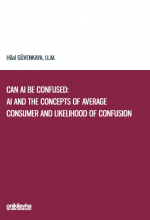 This thesis, which is written as a part of the author's master's studies funded by the Jean Monnet Scholarship, examines the profound implications of artificial intelligence on two of the core concepts of trademark law, namely, the average consumer and the likelihood of confusion. With the rise of intelligent personal assistants, chatbots, and recommender systems, AI increasingly shapesand in some cases, supplantsconsumer purchasing decisions in online marketplaces. This shift challenges the applicability of the above-mentioned legal principles designed by taking into account human decision-making in an AI-driven environment. The research delves into how AI influences consumer behavior, redefines the concept of the average consumer, examines the impact of the use of AI on the conditions and evaluation of the likelihood of confusion, and raises the possibility of AI itself being seen as the consumer in scenarios where it autonomously completes transactions. Through comparisons with the jurisdiction on keyword advertising and discussions on unconventional trademarks like machine-readable formats, the thesis underscores the need to adapt these two core concepts of trademark law to address AI's transformative role in commerce, ensuring legal frameworks remain relevant in the evolving digital marketplace.(ARKA KAPAKTAN)
This thesis, which is written as a part of the author's master's studies funded by the Jean Monnet Scholarship, examines the profound implications of artificial intelligence on two of the core concepts of trademark law, namely, the average consumer and the likelihood of confusion. With the rise of intelligent personal assistants, chatbots, and recommender systems, AI increasingly shapesand in some cases, supplantsconsumer purchasing decisions in online marketplaces. This shift challenges the applicability of the above-mentioned legal principles designed by taking into account human decision-making in an AI-driven environment. The research delves into how AI influences consumer behavior, redefines the concept of the average consumer, examines the impact of the use of AI on the conditions and evaluation of the likelihood of confusion, and raises the possibility of AI itself being seen as the consumer in scenarios where it autonomously completes transactions. Through comparisons with the jurisdiction on keyword advertising and discussions on unconventional trademarks like machine-readable formats, the thesis underscores the need to adapt these two core concepts of trademark law to address AI's transformative role in commerce, ensuring legal frameworks remain relevant in the evolving digital marketplace.(ARKA KAPAKTAN)
Table of Contents
Introduction
1. Definitions
1.1. Trademark and Its Functions
1.2. Average Consumer
1.3. Likelihood of Confusion
1.4. Artificial Intelligence
1.4.1. Types of AI Related to Research Subject
1.4.1.1. Intelligent Personal Assistants
1.4.1.2. Chatbots
1.4.1.3. AI-Driven Platforms and Recommender Systems
2. Interrelation of AI and the Concepts of the Average Consumer and the Likelihood of Confusion
2.1. AI and the Human Average Consumer
2.1.1. AI's Role in the Purchasing Decision and Its Impact on the Confusion of Human Average Consumer
2.1.2. Google Effect
2.1.3. AI-Driven Platforms and Consumer Choice
2.1.4. The Role of Post-Sale and Initial Interest Confusion in AI-Assisted Purchases
2.2. AI as the Average Consumer
2.2.1. Can AI Be Confused?
2.2.2. Feedback Loops, Manipulation and Likelihood of Confusion
3. Current State of Play and Future Directions
3.1. Analogy Between AI-Powered Product Suggestions and Keyword Advertising
3.2. Impact of AI on Consumer Search Cost and Likelihood of Confusion
3.3. Machine Readable Formats as New Unconventional Trademarks
Conclusion
List of Legislation
List of Case Law
Bibliography
